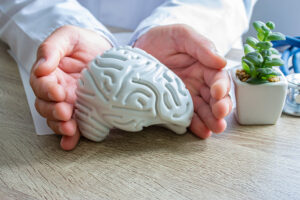
It’s estimated that the average person makes about 35,000 decisions each day, and each decision carries consequences that can be good or bad. From deciding what foods to eat or movies to watch to more life-altering decisions like a home purchase and career change, a specific part of your brain called the prefrontal cortex manages it all.
The prefrontal cortex is the cerebral cortex located in the frontal lobe. Serving as the decision-making powerhouse of the brain, your prefrontal cortex helps you make choices and behave in ways that keep you healthy and safe. However, alcohol and drug abuse can send your prefrontal cortex into a state of dysfunction that only addiction treatment can treat.
What is the Prefrontal Cortex?
This large section at the front of your brain is responsible for more than just decision making. It also manages executive functions, such as attention, predicting consequences of actions, impulse control and emotion regulation, behavior adjustment and planning for the future.
When all these functions are in sync, your brain naturally checks and balances your thoughts, emotions and decisions to keep you grounded. Take your craving for a delicious, sweet after-dinner dessert as an example. Your prefrontal cortex serves as a security checkpoint, helping you determine if it’s worth indulging in that dessert or not. In some cases, your prefrontal cortex may prevent you from acting on your impulse.
Your brain follows this same process with alcohol and drug use. Unfortunately, constant drinking or drug use can prevent your prefrontal cortex from doing what it’s designed to do. Taking that first step in getting help for drug and alcohol addiction can be crucial in restoring these natural brain functions.
The Link Between the Prefrontal Cortex and Substance Abuse
From your brain’s perspective, an addiction to drugs or alcohol often centers around reward. Drugs and alcohol cause your brain to create more dopamine (a chemical that triggers feelings of pleasure).
Over time, your brain will associate your drug of use with pleasure and crave it to maintain the flood of dopamine it’s grown accustomed to, contributing to the Long-term Effects of Alcohol on the Brain.
Under normal conditions, your prefrontal cortex can associate continued drinking and drug use with negative, unappealing consequences. However, the brain’s need for more dopamine outweighs the prefrontal cortex’s desire to make healthy decisions.
Once addicted, your prefrontal cortex is no longer capable of stopping you from making decisions or behaving in ways that promote continued substance abuse. You may turn a blind eye to the physical toll addiction is taking on your body, minimize the risks of continued substance abuse on your career and relationships, and even attempt to justify your actions.
Ultimately, alcohol and drug abuse prevent you from making rational and logical decisions you used to make before addiction. Fortunately, this doesn’t have to be a permanent change. Addiction treatment centers like The Raleigh House can help treat addiction and its underlying causes to heal your brain and bring it back to a balanced state.
Find Hope for Lasting Recovery at The Raleigh House
At The Raleigh House, we have over 10 years of experience helping people like you overcome addiction. At our wellness lodge located on 40 scenic acres of beautiful Colorado land just outside of Denver, you’ll find a place where healing is top priority.
With our gold standard continuum of care, you can address the underlying causes of your addiction as you work towards lasting recovery. Contact our admissions team today to learn how to get started.
